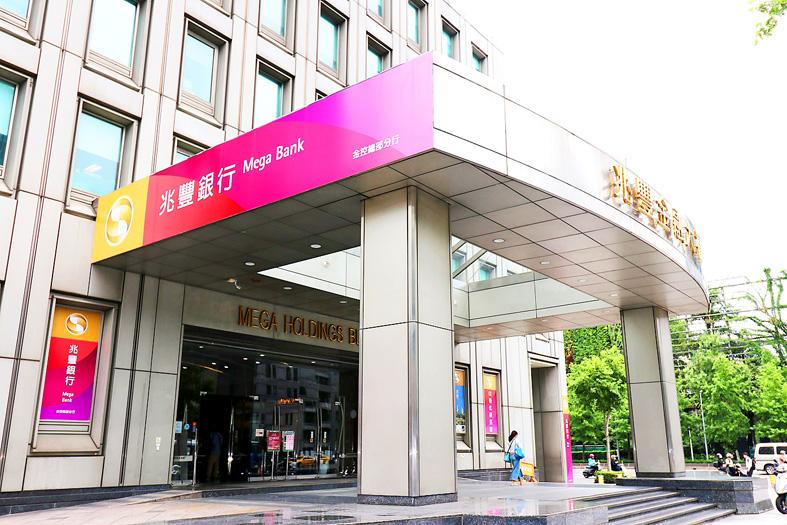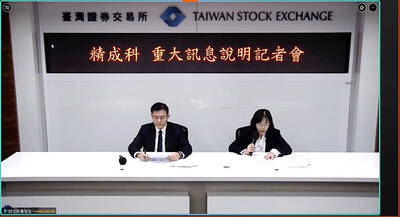State-run Mega International Commercial Bank (兆豐銀行) yesterday said that it would offer high interest rates for time deposits denominated in US dollars for a limited time next month, as local lenders seek to take advantage of growing investment interest in the greenback.
The banking arm of Mega Financial Holdings Co (兆豐金控) said that it would offer interest rates of 7 percent for two-month time deposits denominated in US dollars, in an effort to stay competitive with peers that offer similar rates.
The rates would be in effect from Aug. 1 to 5 for individual deposits of US$1,000 to US$3,000 per account, the bank said, adding that it would set a cap of US$3 million for the campaign.

Photo: Lee Chin-hui, Taipei Times
The offer, limited to digital accounts and online currency exchanges, aims to gain and retain customers over the Internet, tap the wealth management business and stimulate investment interest, the bank said.
Mega Bank became the fourth local lender to announce high interest rates after CTBC Bank’s (中信銀行) 10 percent, O-Bank Co’s 8 percent (王道商業銀行) and Bank SinoPac’s (永豐銀行) 7 percent.
Local investors have shown a rising interest in US dollar assets this year after the US Federal Reserve in March started increasing interest rates to fight inflation, Mega Bank said.
Deep price corrections in global bourses have driven stock investors to the sidelines and prompted them to park their money in time deposits, it said.
US dollar-denominated savings deposits have become a standard component of investors’ portfolios, the bank said.

SEMICONDUCTORS: The firm has already completed one fab, which is to begin mass producing 2-nanomater chips next year, while two others are under construction Taiwan Semiconductor Manufacturing Co (TSMC, 台積電), the world’s largest contract chipmaker, plans to begin construction of its fourth and fifth wafer fabs in Kaohsiung next year, targeting the development of high-end processes. The two facilities — P4 and P5 — are part of TSMC’s production expansion program, which aims to build five fabs in Kaohsiung. TSMC facility division vice president Arthur Chuang (莊子壽) on Thursday said that the five facilities are expected to create 8,000 jobs. To respond to the fast-changing global semiconductor industry and escalating international competition, TSMC said it has to keep growing by expanding its production footprints. The P4 and P5

Printed circuit board (PCB) maker Global Brands Manufacture Ltd (精成科技) is to fully acquire Japanese peer Lincstech Co for about NT$8.4 billion (US$256.9 million) as the company aims to add high-end PCBs to its PC-centric product lineups. The company also expects the deal to help expand its manufacturing sites in Southeast Asia, as local firms diversify to mitigate geopolitical risks. “The acquisition will mean an important step for the company to further expand its presence in Southeast Asia and globally,” Global Brands Manufacture chief financial officer Weng Chia-yu (翁家玉) said at a news conference in Taipei yesterday. The company has set up manufacturing

DOWNFALL: The Singapore-based oil magnate Lim Oon Kuin was accused of hiding US$800 million in losses and leaving 20 banks with substantial liabilities Former tycoon Lim Oon Kuin (林恩強) has been declared bankrupt in Singapore, following the collapse of his oil trading empire. The name of the founder of Hin Leong Trading Pte Ltd (興隆貿易) and his children Lim Huey Ching (林慧清) and Lim Chee Meng (林志朋) were listed as having been issued a bankruptcy order on Dec. 19, the government gazette showed. The younger Lims were directors at the company. Leow Quek Shiong and Seah Roh Lin of BDO Advisory Pte Ltd are the trustees, according to the gazette. At its peak, Hin Leong traded a range of oil products, made lubricants and operated loading

The growing popularity of Chinese sport utility vehicles and pickup trucks has shaken up Mexico’s luxury car market, hitting sales of traditionally dominant brands such as Mercedes-Benz and BMW. Mexicans are increasingly switching from traditionally dominant sedans to Chinese vehicles due to a combination of comfort, technology and price, industry experts say. It is no small feat in a country home to factories of foreign brands such as Audi and BMW, and where until a few years ago imported Chinese cars were stigmatized, as in other parts of the world. The high-end segment of the market registered a sales drop